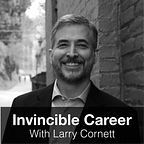
Whatever you want to achieve this year, the framework is simple for successfully doing it. However, while it might be simple — and perhaps even obvious — it is not easy.
It’s kind of funny. I encounter many people who are looking for the “secret to success.”
They want to hear about some new hack, technique, or strategy that they have never seen. They want something that no one has ever thought of before.
Sorry, folks. Nothing is new.
Or, I could say, what’s old is new. The secret framework for success has existed for a long time.
People write about it in different ways. Some behave as if it is magical, and they have discovered it. Yeah, right.
Others are more honest.
For example, James Clear is honest and straightforward when he says that successful change is all about your daily habits.
Cal Newport shares the not-so-secret to success that you need to work really hard, build valuable skills, and become so good that they can’t ignore you.
Obvious, huh?
Yes, well, that may be true. I’m sometimes told that some of my advice is obvious, too.
But, here’s the kicker. Hardly anyone is actually following the advice. They complain that it is obvious, but they aren’t doing anything with it.
I’ve mentioned this story before. Someone came up to me after a talk I gave at a conference in Australia.
They said, “I really enjoyed your talk. But, some of what you said about career growth was kind of obvious. I already knew that.”
I smiled, “Oh, good! So, you’re already doing all of those things to advance your career. How has it been working for you?”
They blushed and said, “Well… I’m not actually doing them. But I know that I should.”
I see.
It’s obvious, and it probably works, but you aren’t taking action.
I think we all are familiar with the framework that I share below. But, perhaps this is the real secret to success:
You have to actually do it.
You have to follow it.
Every
Single
Step
If you intentionally use this strategy this year, you will successfully achieve most of your goals. Yes, random chance and factors beyond your control can disrupt your plans.
But, most of our failures are due to something we have done or not done. We usually have ourselves to blame for many things we do not achieve.
I’m just as guilty. I haven’t published my book yet, and that is entirely my fault. I haven’t created a robust system, and I haven’t prioritized the work enough.
Without further ado, here is a simple framework for your success this year.
Goals
You’re probably familiar with SMART goals. They are Specific, Measurable, Achievable, Relevant, and Time-bound. I’m not going to bore you with the details since I’m sure you’ve heard about them. If not, read up on them here.
Many organizations and individuals have been using a new goal-setting method of establishing OKRs, which stands for Objectives and Key Results. The objectives in OKRs can provide more general and inspirational goals than the SMART approach, which tends to focus on more discrete and specific efforts.
Want to learn more about OKRs? John Doerr wrote the bestselling book, Measure What Matters: OKRs: The Simple Idea that Drives 10x Growth.
However, let’s make it simple. Goal-setting doesn’t have to be some crazy, complex exercise.
Start by brainstorming a huge list of all of the things you want to achieve this year, both personal and professional. I asked my premium subscribers to do that this week and I’ll be discussing their plans with them in my community.
Some things to keep in mind:
Capture more than your professional goals. Your personal development goals are important, too. They should inspire you. Make a commitment to yourself and your relationships, health, and well-being. ← Tweet this
Be specific about your goals, and make sure your progress can be measured. You want to be able to determine if you achieved a goal or not. Nothing fuzzy, such as “get better at writing.” Be specific with something you can measure, such as “Write and publish one article of 500-800 words every week.”
Be realistic and set goals that can humanly be achieved in a year or less. I love ambition. But, don’t set yourself up for failure with an unattainable goal (e.g., “I’m going to run a marathon, even though I’ve never had a run longer than 1 kilometer in my entire life”).
Create a list of small, medium, and large goals. It’s nice to have some wins along the way.
Review your goals with a trusted supporter (more on this later). It’s useful to have a sounding board who can help us judge if we’re being reasonable with some of our goals or have too many goals. For example, if you want to publish a book this year, run your goal by someone who has actually published a book before and can tell you if what you are planning is possible.
Note, your probability of achieving a goal is only about 10% when you simply have a goal in mind. That’s why you need the rest of the framework below.
Plan
A goal without a plan is simply wishful thinking. Your plan will define how you specifically intend to pursue the activities that will enable you to achieve your goals.
Start with a high-level plan for the overall year. Prioritize your goals and map them into your year accordingly.
For example, shorter-term, higher-priority goals can be your focus for the next few months. Some goals will require other goals to be accomplished first (e.g., competing in a race means that you will need earlier goals to train for it).
Break the larger goals down into a series of sub-goals and steps you need to build up to achieve them. For example, the goal of landing a new job has sub-goals and actions required before you can accept the offer. That includes:
Deciding what your next career move should be
Writing your elevator pitch
Updating your resume
Writing cover letters
Updating LinkedIn
Creating a portfolio
Creating an interview presentation
Strengthening your network
Reconnecting with people in your network
Researching interesting companies
Looking for job openings
Asking for warm introductions
Securing interviews
You get the picture…
Essentially, map out the steps and actions you should take every day, week, and month for each of the goals you wish to accomplish. Create a plan for every week this year.
It doesn’t have to be excruciatingly detailed, yet. Some goals don’t require that degree of planning anyway. Your goals and plans will be adjusted as you make progress and learn more.
However, you should have a general framework in place for how you will attack your goals this year.
Your probability of accomplishing your goal rises to 40% if you set a date by which you will achieve it. It climbs to 50% when you create a plan for how you will do it. ← Tweet this
Habits
James Clear would tell you, “Commit to a process, not a goal.” Although I do like goals and plans, he’s right about the value of a process.
If you don’t take action consistently, you won’t make progress. Many people create goals and plans, but very few make it all the way through their plans to achieve final success.
I get it. It becomes overwhelming.
If you set your eyes on a significant goal, you can become discouraged when daily progress feels minuscule. It seems like you will never reach your goal, and many give up.
Such is the nature of significant achievements, though. Making progress does feel onerous. The work is hard, and sometimes it becomes monotonous.
Any writer will tell you that they get burned out. The daily practice is often tiring, stressful, and not exciting.
I have a friend who became wildly successful last year. For many people, it looked as if she came out of nowhere. You know, an overnight success.
However, I know her. I know that she has been putting in the work all day, every day, for over 10 years. Not overnight. Ten years.
I’m sure that she felt like it was a grind at times. But, now she’s reaping the rewards, although the hard work never ends.
If you want to succeed in achieving your goals and working on your plans, you need to turn those actions into daily habits. Some might be weekly habits, but I would guess that you should be doing something every day — in some way — if you want to accomplish something important for you. ← Tweet this
For example, I work out every day. I made that a habit and have been doing it for over 12 years.
I also write every day. It’s the only way that I can make progress on my goals.
What do you need as daily habits in your life to achieve your goals this year? They can be as little as a 30-60 minute commitment every day.
Schedule time
One of the biggest reasons people fail to achieve their goals is that they can’t find the time to work on them. They don’t make the goal a priority, and they don’t schedule time on their calendar to work on it every day or week. ←Tweet this
Once you have defined your daily and weekly habits, block time on your calendar for them. I schedule time on my calendar to work out every morning. I block off entire afternoons to write my articles, newsletters, and books.
Do not let other people have full control of your calendar, which gives them full control of your life. The first step to taking back your power and freedom is to own your time.
I know that an employer probably requires many of the hours on your calendar, Monday through Friday. But, that doesn’t mean that they should own your evenings and weekends too.
Your employer will take all of your time if you allow them to do so. I know that some of my past employers certainly took advantage of my workaholic tendencies. But your future is too valuable to let that happen. ← Tweet this…
Track progress
If you have defined measurable goals, you can track your progress. You will be able to determine if you are on track to achieve your goals.
I do this with every goal that is important for my life. For example:
I have realistic weightlifting goals (e.g., how much I want to be able to deadlift).
I have workout plans that I follow (and I’ve worked with coaches).
I have a daily habit of exercising in the morning.
I schedule time on my calendar to protect that time.
I track my progress.
I assess if the plan seems to be working or if I need to make adjustments.
I hold myself accountable by sharing my workout videos and posts.
I do the same thing professionally, too. I am writing content for a course right now. I have a deadline, and I made a plan. I have a daily habit of writing a script.
I track my progress in a spreadsheet and on a big whiteboard that I can’t ignore. My progress stares me in the face every day. I know when I’m falling behind my commitment to write four scripts every week.
Tracking your progress can be motivational. It’s helpful to see how far you have come, even when it feels like you still have so far to go.
Accountability
The secret sauce of success is combining habits, tracking, and accountability. I’ve shared this before, but it still blows my mind.
If you promise someone else that you will achieve a goal, your probability of success rises to 65%.
When you schedule regular accountability appointments with someone, your probability of success goes up to 95%!
I did this when I started working out at a CrossFit box. I felt accountable to my coach. I also knew that my friends in the gym were waiting for me. They expected me to show up every morning and gave me grief if I skipped a workout.
I’ve created the same type of accountability environment for my Career Accelerator. We meet every week, discuss goals and activities, support each other, give advice, and hold each other accountable for making progress toward our goals. That community helps us all stay on track.
Now, I’m expanding my community to be more accessible to more people. My new community is much more affordable, but not free (although you can try it for free for a week).
Why is it not free? Well, I’ve learned over the years that people don’t commit as much to something free. They don’t value it as much, either.
When something is free, it is easy not to show up and not to make any progress. When you pay for support, advice, and access to a professional community, you value it more. You show up to get your investment out of it.
Speaking of community…
Those of you who are premium subscribers should have received an email yesterday about joining my new community to help you with your weekly professional challenges.
That email has links that will give you free access to join the online version of the year-long course of challenges. Feel free to use it to ask me questions, discuss the details, get feedback, or chat with other members of the community.
If you are not a premium subscriber yet, you can upgrade your subscription to join the course. Or, learn more about the community here.
My Invincible Career Community is a supportive group of ambitious professionals where you will benefit from guidance, feedback, accountability, and inspiration from experts and peers.
We don’t bite. 😉 Everyone is very friendly and helpful.
Best of luck!
I wish you the best of luck with your goals this year. Feel free to ask questions in the comments on this post online.
Check out my new community if you want a group of smart, friendly, and ambitious people to help you make progress and stay accountable to achieving your goals.
Larry Cornett is a leadership coach and business advisor who hosts a private mastermind community for ambitious professionals with weekly challenges, office hours, and 24x7 support. If you’re interested in starting your own business or side hustle someday (or accelerating an existing one), check out his “Employee to Solopreneur” course (launching in 2022).
Larry lives in Northern California near Lake Tahoe with his wife and children, and a gigantic Great Dane. He does his best to share advice to help others take complete control of their work and life. He’s also on Twitter @cornett.
📰 Interested in sponsoring an upcoming newsletter and reaching my community of ambitious professionals, leaders, job seekers, recruiters, and hiring managers? Contact me for more information about ad placements.











